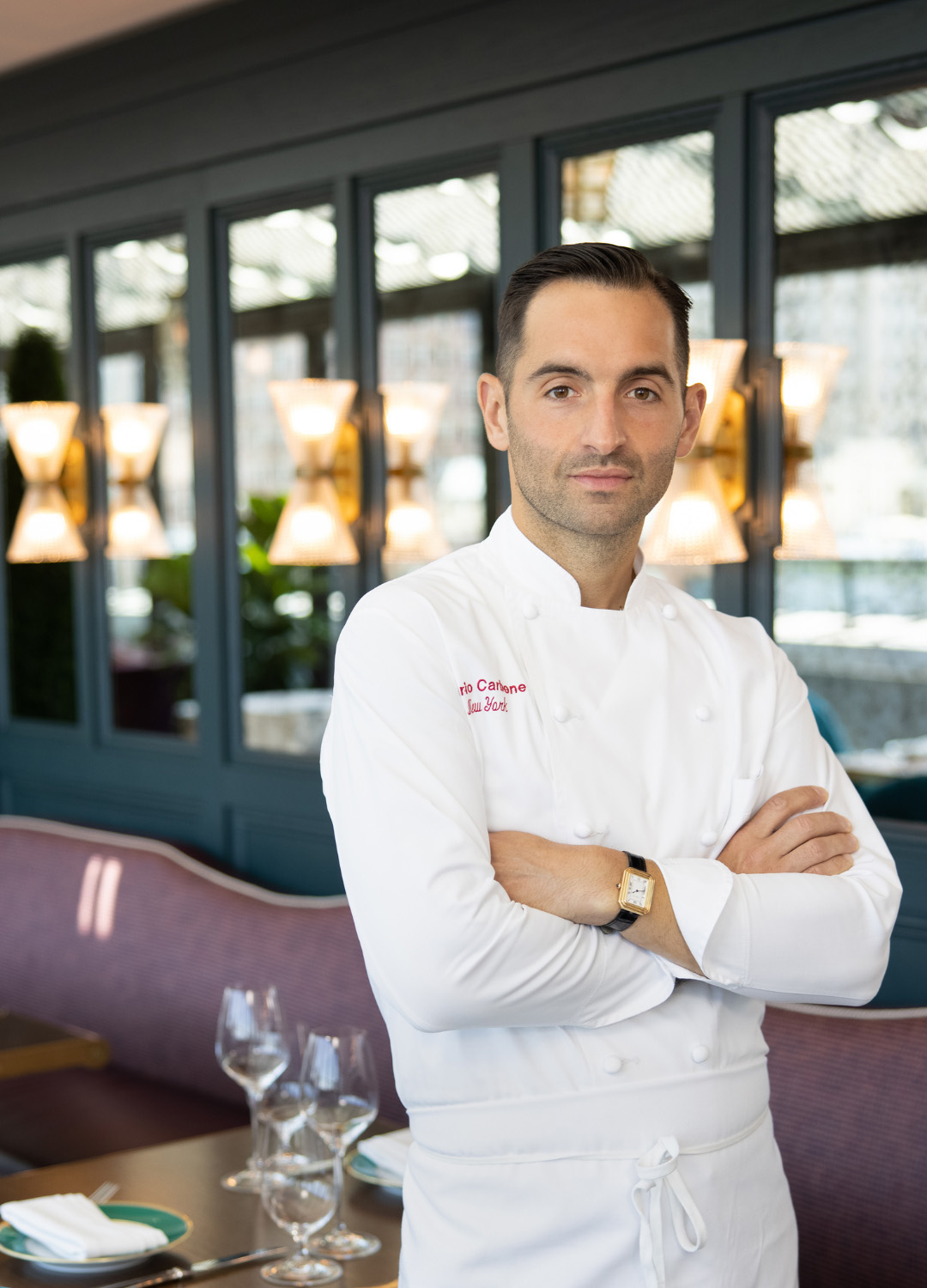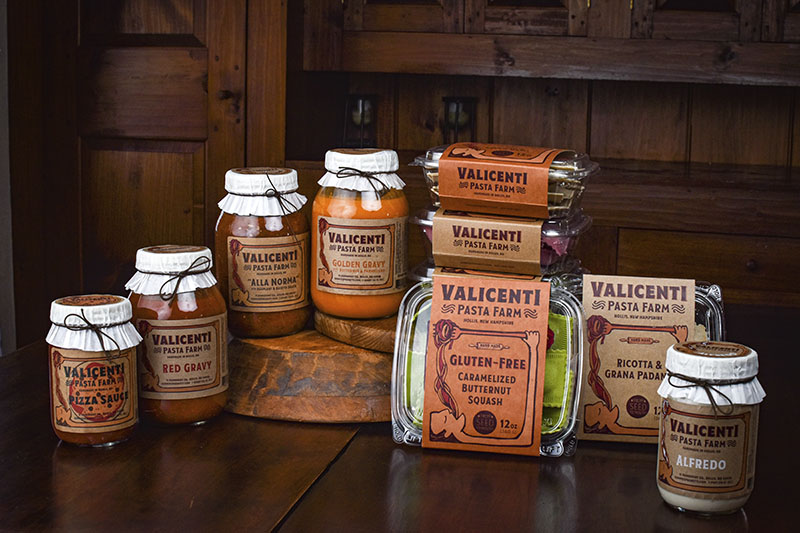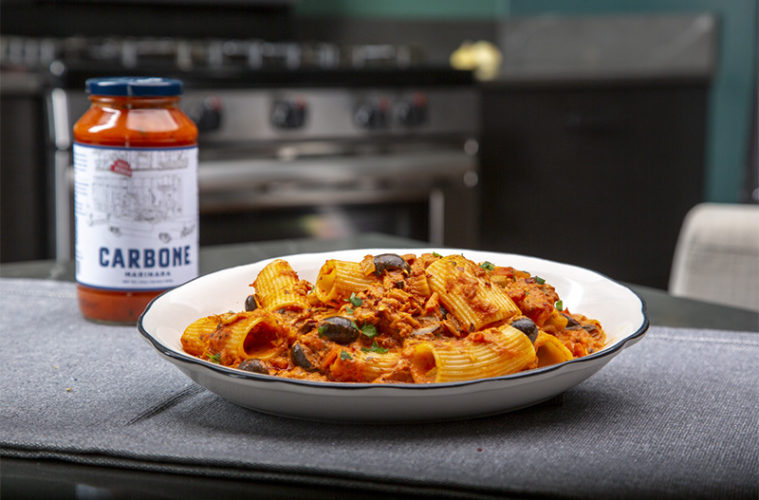Having a jar of tomato sauce in your cupboard is like a secret weapon. Sure, you can whip up a fast weeknight meal just by adding some pasta, but if the sauce is made from high-quality ingredients, it can do much more.

But here’s something we never thought of: Mario Carbone, the Michelin-starred chef behind high-end Boston restaurant Contessa and the new Burlington location of his casual red-sauce joint Parm, uses his jarred sauce—recently debuted in New England at markets like Shaw’s and Whole Foods—instead of Bloody Mary mix for a boozy brunch favorite.
“I use our Arrabbiata, because I like it spicy, and add some Tabasco sauce as well,” the chef says, noting that he prefers tequila as the base spirit. Shake the whole thing with ice, and pour over fresh cubes with whatever garnish you’d like, and it’s a surprising Sunday treat.
Of course, if you’re going to drink pasta sauce, it needs to start with top ingredients. “We go through a lot of trouble in finding the best of the best,” Carbone says. “I’ve been to the place in Italy where the tomatoes come from, I’ve met the pickers and met the owners, and I’ve been in the fields.”
Carbone’s jarred sauce even uses fresh oregano, rather than dried, which means hand-separating the leaves from the stems. “Oregano is a really tiny leaf,” he says. “It’s a long process.” But well worth it, he argues. “It’s a completely different experience when you pop the jar and you get that smell of the fresh herbs.”
David Valicenti, owner and chef at Valicenti Pasta Farm in Hollis, New Hampshire, goes a step farther. He not only knows the growers, but in many cases he actually is the grower of the veggies that go into his jarred sauces—Red Gravy, Golden Gravy, pesto, and a pizza sauce. He also produces pasta, made from locally milled grain, and ravioli filled with local dairy and produce.

“It’s seed to sauce,” says Valicenti, whose commercial kitchen is in a converted apple barn in the town where he grew up, right across the road from his parents and steps away from his gardens. “I make it from our farm produce—it’s actually as if you grew it, made it, and put it up for the winter. That’s what we do.”
In fact, while Valicenti spent his early career in fine dining, even moving to New Orleans to work at renowned restaurant Arnaud’s, a bountiful harvest of fresh tomatoes and a homespun sauce recipe set him on a different path. He was originally hoping to open a farm-to-fork restaurant in that barn, and cooked up some sauce to sell at a local farmer’s market to help finance it. The first batch flew off the shelves, and the rest is history. From his beginnings, selling at farmers markets in Newburyport, Marblehead, and Cambridge, he’s now up to 34 markets, as well as featured at Whole Foods and natural grocers up and down the East Coast. Demand is such that his barn-turned-commercial kitchen is bursting at the seams, and the chef is eyeing his next move, hoping to expand to a bigger space.
Like Carbone, Valicenti thinks outside the pasta box. He likes to use his sauce in many dishes. “I love to braise a big thick piece of sea bass or halibut with the red sauce and some wine, fresh fennel, and cracked olives, finished in the oven.”
Another favorite dish, perfect for the winter months ahead, involves cooking dried fava beans in a mix of battuto (an Italian flavor base akin to what the French call mirepoix), tomato sauce, and water over several hours. “It’s this super hearty, meaty casserole type dish that’s really, really good.” Valicenti’s mom likes to add chicken stock to his Golden Gravy—a lush butternut squash-based sauce—to make a soup, finished with prosciutto and a dollop of crème fraîche.
The combination of fine dining skills and family traditions shared by both chefs is incredibly versatile, and it adds up to a superior product. It’s not often you can grab something off the shelf that is made without compromising ingredients or techniques.
Chef Carbone sees growth in the premium pasta sauce market as indicative of bigger trends. “I think it’s a demand for higher quality products,” he says. “It’s a demand from the customer to know where their foods are coming from.”

